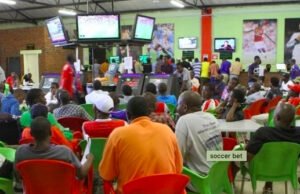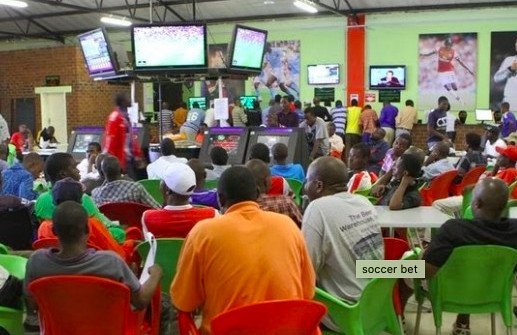
Introduction:
Sports betting has long been a popular pastime in Africa, but in recent years, it has taken on a new level of intensity. With the advent of online betting platforms and the explosion in popularity of football, African nations such as Nigeria, Ghana, South Africa, Ivory Coast, Senegal, and the Congo have witnessed a rise in uncontrollable sports betting, leading to a surge in gambling addiction. This blog post aims to explore the reasons behind this phenomenon specifically in these countries, its implications on society, and potential solutions while acknowledging the challenges faced by governments in addressing the issue.
- The Culture of Football Craze:
Countries like Nigeria, Ghana, South Africa, Ivory Coast, Senegal, and the Congo are known for their deep passion for football. The local and international football leagues in these nations have a massive following, making them fertile ground for the growth of sports betting. The craze for football creates an environment where individuals are more likely to engage in betting activities. - Accessibility and Convenience:
Online betting platforms have revolutionized sports betting, making it easily accessible to anyone with a smartphone and an internet connection. This accessibility, coupled with the convenience of placing bets on favorite teams or players with just a few clicks, has contributed to a surge in gambling addiction. Continuous and impulsive betting becomes easier due to the ease of accessing these platforms. - Marketing Strategies:
Betting companies in Nigeria, Ghana, South Africa, Ivory Coast, Senegal, and the Congo have employed aggressive marketing strategies to target individuals, particularly exploiting vulnerable populations. The promise of easy money and exciting rewards, coupled with celebrity endorsements, has lured many into placing bets. The constant bombardment of advertisements on television, radio, and social media platforms has played a significant role in increasing the number of bettors and contributing to gambling addiction. - Economic Hardships and Desperation:
These countries often face economic challenges and poverty, which leads individuals to seek alternative sources of income. The allure of sports betting presents itself as a potential solution to financial struggles and offers hope for a better life. However, the desperation to overcome poverty often leads to impulsive and risky betting behaviours, exacerbating the problem of gambling addiction. - Lack of Regulation and Support:
One major obstacle faced by these nations is the inadequate regulation of sports betting, allowing betting companies to operate with minimal oversight. https://www.amazon.co.uk/Science-Sport-Recovery-Chocolate-Servings/dp/B0013GATGK/ref=sr_1_8?crid=IXVB6P03RUGX&keywords=sports+recovery+products&qid=1696110141&rdc=1&sprefix=sports+prod%2Caps%2C110&sr=8-8#:~:text=%3Ciframe%20sandbox%3D%22allow,link_opens_in_new_window%3Dtrue%22%3E%3C/iframe%3E The lack of effective regulation makes it easier for predatory practices to thrive, making vulnerable individuals susceptible to gambling addiction. Furthermore, there is often a lack of sufficient support systems for gambling addiction, leaving individuals and families without the necessary resources for help. - Socio-economic Impact:
The rise of gambling addiction in countries like Nigeria, Ghana, South Africa, Ivory Coast, Senegal, and the Congo has dire socio-economic consequences. Families are torn apart by the financial strain caused by gambling debts and individuals suffer from mental health issues due to the compulsive nature of addiction. The focus on betting also diverts resources and attention away from other productive ventures in society, hindering economic growth. - Potential Solutions:
Addressing the problem of uncontrollable sports betting and gambling addiction requires comprehensive measures tailored to the specific challenges faced by each country. While the governments may face limitations, there are steps that can be taken:
- Strengthening regulation: Governments can work towards introducing stricter regulations and enforcing licensing requirements for betting companies to ensure responsible gambling practices.
- Public awareness campaigns: Educational campaigns about the risks of excessive gambling should be implemented to inform the public about the dangers and signs of addiction. These campaigns can be targeted towards vulnerable communities to increase awareness.
- Rehabilitation and support: Increased investment in gambling addiction treatment facilities, helplines, and counseling services can provide much-needed support for individuals struggling with addiction. Governments can collaborate with NGOs and organizations specializing in addiction recovery to establish support networks.
- International cooperation: African governments can work together and collaborate with international organizations that have experience in addressing gambling addiction to learn from successful strategies implemented in other countries.
Conclusion:
The rise of uncontrollable sports betting and gambling addiction in African nations like Nigeria, Ghana, South Africa, Ivory Coast, Senegal, and the Congo is a pressing issue that needs urgent attention. While the governments may face challenges and limitations, steps can be taken to strengthen regulation, raise public awareness, and provide better support systems for individuals and families affected by gambling addiction. Collaborative efforts between governments, betting companies, and support organizations can significantly mitigate the negative impacts on society and protect the vulnerable populations from the devastating effects of excessive sports betting.”





